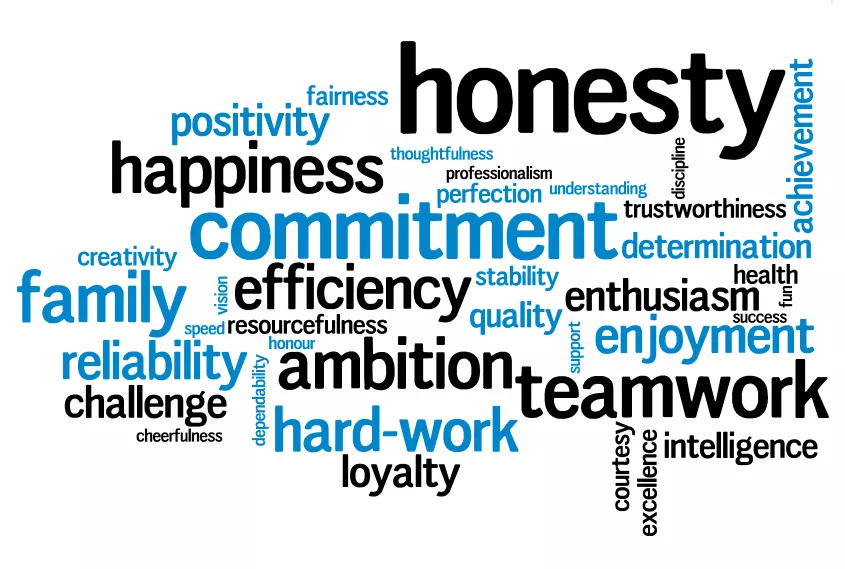As a student affairs professional, you probably love crafting icebreakers, running team-building activities, and facilitating goal-setting sessions with students.
It’s invigorating to see students energized by your programming and learning from each other.
But, do you enjoy running activities with your staff? After all, most of your coworkers have likely seen (and done) it all. Going to an escape room, playing Two Truths and a Lie, or setting SMART goals likely won’t dazzle them.
Yet, you hopefully also know the power of such activities. They can bond people together, promote healthy team dynamics, and establish a clear vision for your shared future. And they’re essential during staff retreats, which typically aim for all these benefits.
So, how can you lead retreat activities without everyone begging for a nap session at the end?
I have some ideas — 20, actually. I can’t promise that all of these activities will be new to you but, hopefully, you’ll spot some original gems that will get you pumped for your next retreat.
Light & Breezy
1. Puzzle Race
I’d rarely advise rushing anything, but this is a fun exemption. Split up into teams, plop down with puzzles, and let the race begin!
Thanks to companies like Shutterfly, Puzzle You, and Collage, you can turn any photo into a puzzle. Perhaps you can use a recent picture of your team, a memorable selfie from a student event, or a talented student photographer’s amazing campus snapshot. And post-retreat, you can frame the complete puzzles as artwork in your office.
2. Custom trivia
Forget the one-sided lecture or PowerPoint. Trivia can remind your team of vital facts while keeping things light and fun. Pick one enthusiastic team member to create the questions and get their Alex Trebek on as trivia host.
Categories can include office procedures, student trends, institutional history, student development theories, higher education news stories, and anything else you dream up. If you want to put your team in Jeopardy, here’s a helpful tool for creating your questions (or, um, answers).

3. Board game tournament
Clue, Pictionary, Yahtzee — These are all teambuilders waiting to be unboxed. I recommend avoiding games that involve elimination. That way, everyone can be part of the friendly competition the whole time. You can play several games all at once or pace the tournament out for refreshing breaks throughout the retreat.
4. The soundtrack of your lives
Even horrendous singers (like me) can get musical for this. Prior to the retreat, ask each member of your team to tell you one song that they feel captures their personality, hits upon their professional goals, or speaks to their emotions regarding their work or your students.
Gather all of the song choices into a retreat playlist and play it during breaks. High-energy songs can also work beautifully to get everyone’s energy up at critical times, while softer tunes can be played in the background during brainstorming sessions.
But be sure to set aside time for each team member to reveal which song they picked and why. Singing and dancing along is optional.
5. Show and Tell
Before the retreat, tell everyone that they’ll need to bring in an item of personal significance to share. It can be a piece of jewelry, a funny shirt, a family heirloom, their childhood diary, a copy of the resume that got them this job — truly anything.
For Show and Tell, you can either ask everyone to present on their item and what it means to them or shuffle the items up for everyone to guess each owner before the big reveal.
Another twist is to not inform of every one of this activity beforehand. Simply spring it on them, just before presentation time, so that they’re challenged to get creative in utilizing what’s around them.
We did this at Presence’s latest retreat while standing out on the beach and ended up with some hilarious results! One team member explained how a shell (which he had just found) reflected his personality, and another shared a quirky memory inspired by the sand.
Motivational& Productive
6. StrengthsFinder
This is a classic for a reason. Knowing everyone’s results within a team can help you identify your overall strengths and weaknesses, plus reveal who might be the ideal person for certain responsibilities.
Got someone with woo? They’d probably love to charm guests in an office tour. Is restorative anyone’s top strength? They might jump at the chance to brainstorm solutions to your latest challenge.
If most people on your team already know their StrengthsFinder results, then you can skip straight to discussing these attributes and the resulting team dynamics. Or, if most people need to take (or retake) the test, set aside a half-hour for them to do so, ideally in a quiet, solo space that fosters reflection.
Don’t have the budget for StrengthsFinder? Try this free knock-off. (Just don’t tell Gallup I told you about it.)
7. TED Talks
Technology, Entertainment, Design… and you! TED Talks are no longer niche, hidden gems. They’re mainstream, and might be widely popular with your staff, too.
Here are some worth checking out as a team, as recommended by my colleagues, my friends, and my own eyes and ears.
Simon Sinek — Start With Why
“People don’t buy what you do; they buy why you do it.”
Brene Brown — The Power of Vulnerability
“When we work from a place that says, ‘I’m enough,’ then we stop screaming and start listening. We’re kinder and gentler to the people around us, and we’re kinder and gentler to ourselves.”
David Logan — Tribal Leadership
“Tribes are clusters of people, and people are complex and non-rational at times. If a tribe is united only by agreement, as soon as times change, agreement has to be reestablished.”
Chimamanda Ngozi Adichie — The Danger of a Single Story
“Show a people as one thing, as only one thing, over and over again and that is what they become”
Mellody Hobson — Color Blind or Color Brave?
“We have to be willing to have proactive conversations about race with honesty and understanding and courage, not because it’s the right thing to do, but because it’s the smart thing to do.”
Angela Lee Duckworth — Grit: The Power of Passion and Perseverance
“Grit is sticking with your future, day in, day out — not just for the week, not just for the month, but for years, and working really hard to make that future a reality. Grit is living life like it’s a marathon, not a sprint.”
Rita Pierson — Every Kid Needs a Champion
“Every child deserves a champion — an adult who will never give up on them, who understands the power of connection, and insists that they become the best that they can possibly be.”
Daphne Koller — What We’re Learning from Online Education
“Maybe we should spend less time at universities filling our students’ minds with content by lecturing at them, and more time igniting their creativity, their imagination, and their problem-solving skills by actually talking with them.”
Daniel Levitin — How to Stay Calm When You Know You’ll Be Stressed
“We all are going to fail now and then. The idea is to think ahead to what those failures might be, to put systems in place that will help minimize the damage or to prevent the bad things from happening in the first place. “
Margaret Heffernan — Dare to Disagree
“When we dare to break that silence, or when we dare to see, and we create conflict, we enable ourselves and the people around us to do our very best thinking.”
Can’t pick just one or two? No problem. Rather than watching and debriefing full talks during your retreat, assign a different video to each team member a few days ahead of time. Then, during the retreat, each person can share their favorite quotes from their assigned talk, summarize it, or share a particularly inspiring clip.
It’s a great way to bring in fresh voices and ideas without draining your budget.
8. Podcast reports
Though lacking visual components, podcasts can be just as inspirational, humorous, and informative as TED talks.
You can bring the goodness of audio storytelling to life by asking team members to issue a “podcast report” during your retreat. It’s the 2019 version of a book report! Be sure to bring speakers so you can blast out the best clips, and print out transcripts for anyone with hearing impairments.

Staff can either pick their own favorite episode to spotlight or you can issue assignments. We have some recommendations for you here, specific to higher education. Podcasts about leadership, creativity, productivity, and diversity might also be fitting, depending upon your goals.
9. Word cloud of values
You probably struggle to remember the difference between cirrus, cumulus, and stratus clouds. But what about word clouds?

Now, those are distinct.
Word clouds can help your team visualize interconnected ideas and concepts. They can be especially helpful for remembering values, which you may already plan to discuss in your retreat.
But rather than merely writing down or vaguely discussing your values, craft them into a word cloud. Have each person contribute ideas. Ask what they value most — in their individual work, as a team, in the campus community, or all three. Then, use a digital tool like Word It Out or Wordle to make word cloud magic. (Or better yet, ask an artsy coworker or student to design it.)
You can hang up the resulting artwork/values list combo in your office or print it on office items, such as coffee mugs or mouse pads, so everyone can have a copy.
10. Objectives and Key Results (OKRs)
Retreats are famously (or infamously, depending upon who you ask) used for setting goals. So, rather than the same ole uninspiring goal-setting exercise, why not mix it up? I suggest one of my favorites, used by Presence to great success: OKRs.
As I explained in this post, OKRs foster alignment within a team, guiding every member along the same direction toward clear goals. They’re frequently set, tracked, and re-evaluated.
A retreat held right before a new quarter or semester will especially be perfect timing for OKR-ing. Read this for many more tips on this nifty technique.
11. Connect with Someone Who…
Everyone loves compliments, right? But, I’ve found that most people aren’t sure of when or how to express genuine compliments that venture beyond surface-level remarks like, “nice shirt!”, “great hat!”, or “I loved your program idea!”
This activity can help. I recommend doing it toward the end of your retreat in order to finish on a celebratory, optimistic note.

To start, ask everyone to stand or sit in a circle and close their eyes. Then, as the leader, gently tap a few random participants on the back or shoulder.
Tell the entire group that you’ll be reading a series of statements. If they’ve been tapped, they’ll soon be tasked with slowly moving around the outside of the circle and tapping their teammates to whom they feel each statement applies.
Here are some statement ideas:
Tap someone who…
- makes you laugh
- inspires confidence
- taught you something during this retreat
- you hope to get to know better
- has shown integrity
- you see as a quiet leader
- is extremely creative
- you can always rely upon
- challenges you to do better
- you are proud of
- surprised you during this retreat
- whose honesty you admire
- has amazing energy
- has ideas you’d like to learn more about
You’ll keep repeating the exercise, giving everyone a chance to do at least one round of tapping, until you run out of unique statements.
But no peeking! Part of the joy of this activity comes from feeling an overall sense of appreciation and recognition from your teammates. Individual opinions are less important.
Off-Campus Adventures
12. Laser tag
Work in some childhood nostalgia!
Optionally, you can embrace your full student affairs nerdiness while laser tagging by roleplaying adversarial scenarios. Pretend one team is your staff and the other is a round of budget cuts that you have to creatively survive.
Or, to really mix things up, one team can represent student affairs staff and the other can be academic staff, who all shock the system by working together to score the most total points.
13. Volunteer
Do some good in the world and within your community. Consider volunteering with an organization that you’d like to establish a long-lasting partnership with or one that directly benefits students and their needs.

Spending time at a local volunteer spot that’s popular with students is also a great idea; it’ll give you a chance to better understand your students’ passions and experiences. You could even invite students to join in on this part of the retreat.
14. Kayaking, canoeing, white water rafting, or snow tubing
Every day in student affairs is an adventure. You can seize this spirit by trying out an adventure sport together. Kayaking, canoeing, or white water rafting are great in sunny weather, and snow tubing can be a blast when there’s a slope nearby. (Sorry, fellow Floridians; you’ll have to ignore this suggestion.)
But pick your activity thoughtfully. Be sure it’s something that everyone can fully participate in, considering their experience levels (or lack thereof) and physical abilities.
15. Trampoline park
You’ll literally jump for joy. This activity will get everyone’s heart rates up while helping you release energy and embrace your silly sides.
It probably won’t boost your institution’s retention rate nor emphasize deep-seated values, but having fun can be noble goal in and of itself.
16. Segway tour
Yes, Segways look silly. And yes, you might feel more than a tad bit ridiculous riding one. But a group retreat can be the perfect excuse to try out this fad.
Hopping on for a tour near your campus will allow you to see your community in a new way, especially if you have a professional guide to teach you about the town’s history and future. Plus, this activity may serve as a test round for a future students’ Segway tour.
17. Art class
Whether you paint canvases, sculpt clay, or assemble jewelry, engaging with art gets your creative juices flowing. You don’t need to be a budding Andy Warhol or Frida Kahlo to enjoy it.
You could even exchange the final products as gifts at the end of the retreat, display them in your office, or use them to tell the story of your retreat to other departments.
18. Cooking class
You gotta eat during your retreat anyway. Cooking together can help your team recognize leadership dynamics, prompt you to discuss beloved cultural traditions related to food, and challenge you to problem-solve together.

If you conduct an especially tasty dish, you can pass on the goodness to the rest of campus by sharing the recipe on social media, making it again for a division-wide meeting, or hosting a cooking class with students.
19. Karaoke
This is another one with a simple, yet valuable, benefit: Fun. Head to your local karaoke spot or rent out a machine to get to know everyone’s taste in music, bond over nostalgic tunes, and show off your talents (or enthusiastic lack thereof).
You could even pair this with the “soundtrack of our lives” activity by having each person reveal which song was their pick… by performing it!
20. Hike
Head to the woods, the mountains, the beach, the park, or — if you’re not near any of those — any spot you’re eager to explore by foot. In addition to the physical and emotional benefits of hiking, it can also allow your team to appreciate nature and bond over a challenge.
For smaller groups, you can also answer icebreaker questions, tell stories, or brainstorm ideas while you walk. You could also chow down on a mid-hike picnic. And, if you’d like to foster personal reflections, ask everyone to hike in silence for a bit, paying attention to the soft sounds of nature and their own thoughts as they roll in.
What staff retreat activities do you adore? We’d love to hear your ideas @themoderncampus and @JodiTandet.





